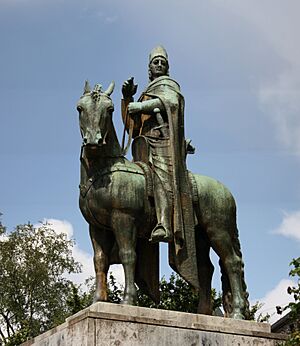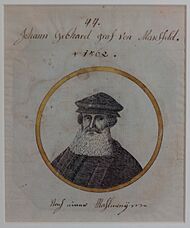Archbishop of Cologne facts for kids
The Archbishop of Cologne is a very important leader in the Catholic Church in western North Rhine-Westphalia, a region in Germany. For a long time, the archbishop was not just a religious leader but also ruled a special state within the Holy Roman Empire. From 1356 to 1801, the archbishop was one of the powerful "prince-electors" who chose the Holy Roman Emperor. This made them very influential!
Since the early days of the Catholic Church, there have been 94 bishops and archbishops in Cologne. Some of them retired, and a few were chosen to help out before they officially took office. Several archbishops of Cologne have also led the German Bishops' Conference, which is a group of all the Catholic bishops in Germany.
Today, Cardinal Rainer Woelki is the Archbishop of Cologne. He took on this role in 2014, moving from Berlin where he was also a cardinal archbishop.
Contents
Leaders of Cologne's Church
Early Bishops (88–784)
The very first leaders of the church in Cologne were called bishops. It's a bit tricky to know all the details about the earliest ones, like Maternus I, because there isn't much information from that time. However, we know that a bishop named Maternus II was part of an important meeting in Rome around 313 AD.
Here are some of the early bishops:
- Maternus I (around 88–128)
- Paulinus
- Marcellinus
- Aquilinus
- Levoldus (around 248–285)
- Maternus II (around 285–315)
- Euphrates (around 315–348)
- Severinus (around 348–403)
- Ebergisil I ? (around 403–440)
- Solatius (around 440–470)
- Sunnovaeus (around 470–500)
- Domitianus (active around 535)
- Charentinus (active around 570)
- Eberigisil II ? (around 580–600 ?)
- Remedius (around 600 ? –611 ?)
- Solatius (around 611 ? –622)
- Cunibert (around 623–663)
- Bodatus (around 663–674)
- Stephen (674–680)
- Adelwin (680–695)
- Giso (695–708)
- Anno I (708–710)
- Faramund (710–713)
- Agilolf (713–717)
- Reginfried (718–747)
- Hildegar (750–753)
- Bertholm (753–763)
- Rikulf (763–784)
Archbishops of Cologne (784–1238)
After 784, the leaders of the church in Cologne were called archbishops. This meant their role became even more important.
- Hildebold (784–818)
- Hadbold (818–842)
- Hildwin (842–849)
- Günther (850–864)
- Hugo Welf (864)
- Wilbert (870–889)
- Hermann I (890–924)
- Wigfried (924–953)
- Bruno I (953–965)
- Volkmar (965–969)
- Gero (969–976)
- Warin (976–984)
- Ebergar (984–999)
- Heribert (999–1021)
- Pilgrim (1021–1036)
- Hermann II (1036–1056)
- Anno II (1056–1075)
- Hildholf (1076–1078)
- Sigwin (1078–1089)
- Hermann III (1089–1099)
- Friedrich I (1100–1131)
- Bruno II von Berg (1131–1137)
- Hugo von Sponheim (1137)
- Arnold I (1138–1151)
- Arnold II von Wied (1152–1156)
- Friedrich II von Berg (1156–1158)
- Rainald of Dassel (1159–1167)
- Philipp von Heinsberg (1167–1191) – He gained the title of Duke of Westphalia and Angria in 1180. From then on, all future archbishops of Cologne also held this duke title.
- Bruno III von Berg (1191–1192)
- Adolf I von Berg (1192–1205)
- Bruno IV von Sayn (1205–1208) (in opposition, meaning he was a rival claimant)
- Dietrich I von Hengebach (1208–1215) (in opposition)
- Engelbert II von Berg (1216–1225)
- Heinrich I von Mulnarken (1225–1237)
Archbishop-Electors of Cologne (1238–1803)
From 1238, the Archbishops of Cologne became even more powerful, holding the title of "Prince-Elector." This meant they were one of the special rulers who had the right to choose the new Holy Roman Emperor. This made them very important figures in European politics.
| Image | Name | From | To | Notes |
|---|---|---|---|---|
| Konrad von Hochstaden | 1238 | 1261 | ||
| Engelbert II von Falkenburg | 1261 | 1274 | ||
| Siegfried II of Westerburg | 1274 | 1297 | ||
| Wikbold I von Holte | 1297 | 1304 | ||
| Heinrich II von Virneburg | 1304 | 1332 | ||
| Walram von Jülich | 1332 | 1349 | ||
| Wilhelm von Gennep | 1349 | 1362 | He was the first Elector of Cologne under the Golden Bull of 1356, a very important law that set out how emperors were chosen. | |
| Adolf II von der Marck | 1363 | 1363 | ||
| Engelbert III von der Marck | 1364 | 1369 | ||
| Kuno von Falkenstein | 1370 | 1371 | ||
| Friedrich III von Saarwerden | 1372 | 1414 | ||
| Dietrich II von Moers | 1414 | 1463 | ||
 |
Ruprecht of the Palatinate | 1463 | 1480 | |
 |
Hermann IV of Hesse | 1480 | 1508 | |
 |
Philip II of Daun-Oberstein | 1508 | 1515 | |
 |
Hermann V von Wied | 1515 | 1546 | He tried to change religious practices in the area. He later changed his own beliefs, which led to him being removed from his position. |
| Adolf III of Schauenburg | 1546 | 1556 | ||
| Anton of Schauenburg | 1556 | 1558 | ||
|
|
Gebhard I von Mansfeld-Vorderort | 1558 | 1562 | He was one of the first members of the Schmalkaldic League, a group of Protestant rulers. |
| Friedrich IV of Wied | 1562 | 1567 | ||
 |
Salentin von Isenburg-Grenzau | 1567 | 1577 | He left his church role in 1577 to get married and continue his family name. He later had a successful military career. |
 |
Gebhard II Truchsess von Waldburg | 1577 | 1583 | He changed his religious beliefs in 1582. This led to a conflict called the Cologne War, which decided who would be the archbishop. |
 |
Ernest of Bavaria | 1583 | 1612 | During his time, the Pope's official representative (Nuncio) was permanently set up in Cologne. |
 |
Ferdinand of Bavaria | 1612 | 1650 | He was part of a family tradition where younger sons often became important church leaders. |
 |
Maximilian Henry of Bavaria | 1650 | 1688 | |
 |
Joseph Clemens of Bavaria | 1688 | 1723 | He faced trouble for supporting France during the War of the Spanish Succession. |
 |
Clemens Augustus I of Bavaria | 1723 | 1761 | He was the last person from the Wittelsbach family to hold this important position. |
 |
Maximilian Frederick of Königsegg-Rothenfels | 1761 | 1784 | |
 |
Maximilian Franz of Austria | 1784 | 1801 | Parts of the archbishop's territory were taken over by France in 1795. |
 |
Anton Viktor of Austria | 1801 | 1803 | The remaining lands of the archbishopric were taken over by other rulers in 1803, ending its role as a state. |
Modern Archbishops of Cologne (1824 to date)
After the old system ended, the role of the Archbishop of Cologne changed. They no longer ruled a state but remained important religious leaders.
- Ferdinand August von Spiegel (1824–1835)
- Clemens August II Droste zu Fischering (1835–1845)
- Cardinal Johannes von Geissel (1845–1864)
- Cardinal Paul Melchers (1866–1885)
- Cardinal Philipp Krementz (1885–1899)
- Hubert Theophil Simar (1899-1902)
- Cardinal Anton Hubert Fischer (1902–1912)
- Cardinal Felix von Hartmann (1912–1919)
- Cardinal Karl Joseph Schulte (1920–1941)
- Cardinal Josef Frings (1942–1969)
- Cardinal Joseph Höffner (1969–1987)
- Cardinal Joachim Meisner (1988–2014)
- Cardinal Rainer Maria Woelki (since 2014)
See also
- Roman Catholic Archdiocese of Cologne
- Cologne Cathedral
 | John T. Biggers |
 | Thomas Blackshear |
 | Mark Bradford |
 | Beverly Buchanan |



